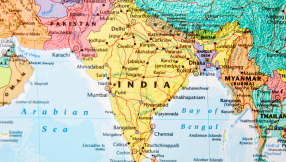One of the saddest parts of the Bible, in purely human terms, is in the book of Ezra. It's set after the return of the Jews from exile in Babylon and is closely linked to Nehemiah – the oldest manuscripts of the Septuagint, the Greek translation of the Old Testament, treat them as one book.

After years of being away from their own country, the Jews have to re-establish the worship of God in the temple, rebuild the walls of Jerusalem and become a functioning country again. They are desperate to recover the purity of their faith, and the returned exiles are presented with a big problem. The (male) Jews who have remained in the land during the Exile – or who had returned in the years before Ezra the priest made the long journey home – have intermarried with women from other nations, the traditional enemies of the Israelites (Ezra 9:1). There's no mention of the female Jews who might have married non-Jews.
When Ezra learns about this a few months after his arrival he is horrified: "I tore my tunic and cloak, pulled hair from my head and beard and sat down appalled" (9:3).
He prays for the people's forgiveness. One of the leaders of the community suggests divorcing the women. Ezra calls a great meeting of the Jews and they meet in the rain in front of the temple. The upshot is that all those who have married foreign women have to divorce them and send them away, with their children (10:44). Whatever love there was between the couples counts for nothing; there's no indication that the women and children were even provided for.
How are we to understand this terrible story? There are three things to remember.
1. The Bible is not racist. When Moses marries a Cushite woman – a black Ethiopian – and his sister Miriam opposes him, she is made to suffer from leprosy (Numbers 12:10) – a terrible judgment. Exodus 12:48-49 says a "sojourner" can partake of the Passover if he is circumcised, a clear indication that it's religion, not race, that defines someone's place within the people of God. Jesus' own ancestors included Gentiles. In the New Testament, John sees a vision of a multitude "from every nation, tribe, people and language" in heaven (Revelation 7:9).
2. This was about religion, not race. It wasn't that they'd married foreigners that was the problem, but that these foreigners had their own gods and goddesses and brought them into the marriage. The situation in Israel/Judah after the extinction of the Jewish kingdom was confused, with many old social structures breaking down. It's not surprising that there was intermarriage, but the Jews were – and are – passionate in their belief that there is only one God. A Jewish settlement in Elephantine, Egypt, contemporary with Nehemiah and Ezra, saw much intermarriage with local people and disappeared. Ezra was determined that it shouldn't happen in Israel.
3. These were special circumstances. At this time the survival of the Jewish people as the people of God was at stake. They were at serious risk of disappearing from history, with their unique testimony to the grace of God lost forever. They survived because of the strength of their faith, and part of that was the strength of their community. Ezra believed what he did was necessary.
Christians today would never counsel divorcing a non-Christian partner – a practice explicitly forbidden in 1 Corinthians 7:12. But we should be just as vigilant as Ezra when it comes to threats to our faith. There are all sorts of ways, subtle as well as overt, in which our faith can be compromised by the world. The most dangerous are the ones we don't even notice. A Godly spouse might be one way in which we're preserved from this, but there is no substitute for prayer and reflection in humility about how we live and what we believe.
Follow Mark Woods on Twitter: @RevMarkWoods













